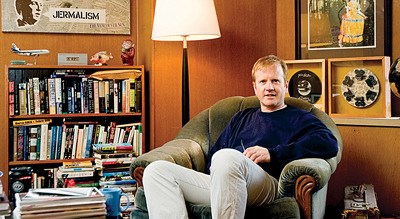After the publication of Timothy Taylors debut novel Stanley Park, some local literati wondered if the author actually existed.
Along with the buzz about his debut novel, Taylors writing was also appearing in the literary magazine Malahat Review, but few knew of the Vancouver-based writer. Was Timothy Taylor a pseudonym?
That intrigue led to a knock at the door of Taylors writing office inside the historic Dominion Building on Hastings. There stood a young, bespectacled UBC creative writing student: Are you Timothy Taylor, the writer? he asked.
Apparently, it wasnt a pen name. Before his first novel, Taylor had a trio of short stories published but still wasnt comfortable telling people he was a writer. He was an MBA grad whod ditched a career in banking to pursue his writing dream a risky move in your mid-30s. As Taylor struggled for freelance bylines, he launched a business consulting practice. Thats also when he started writing Stanley Park, the captivating story of a young Vancouver chef.
When youre writing a novel and its your first, you write with a dream. You hope its good enough to meet this invisible, unmeasurable standard of what is publishable, says Taylor, sitting inside his writing office, surrounded by a welter of books, magazines and research files.
Free of any expectations from publishers or readers, Taylor just wrote, with no anxiety other than: Oh, god, I hope I dont waste five years. He didnt. The best-selling Stanley Park was shortlisted for the Giller Prize and winner of the One Book, One Vancouver prize, catapulting Taylor from unknown author to CanLit sensation.
Five years after the critically acclaimed Stanley Park, Taylor published Story House (2006), also a best-seller, and hes just released his latest novel, the Blue Light Project, a page-turning thriller about a hostage crisis thats also garnered rave reviews.
As a full-time novelist and non-fiction magazine writer, Taylor can no longer afford to keep bankers hours.
I work, if you would add it up, Id say, pretty long hours. Theres a kind of discipline in the sense that I can stay at things and keep my ass in the chair. [A] good four-and-half years to produce a [novel] draft that is seeming about to be my pace, says Taylor, 47.
Taylor acknowledges that the writers life is a solitary pursuit. Three novels later, he has only really spoken about his writing with one other author Steven Galloway, the UBC grad who visited him a decade ago to see if he was real and has since gone on publish the Giller-nominated The Cellist of Sarajevo.
In my own practice, theres very little consultation and Im not sure where that comes from, the secretiveness.
Mostly, its just novelist versus the blank page, something Taylor admits can sometimes be anxiety-inducing.
Youre thinking I sure hope I figure out what the answer to that question is because if I dont, this novel doesnt work. If you carry those questions in your brain for the duration, I think it would really be very difficult to not get discouraged and set it aside. So instead, you have to allow a great number of unanswered questions float with you.
And theres often an even bigger question looming, even for best-selling authors like Taylor, who invest thousands of hours and words into a book with no guarantee of publication.
Novels are written in advance, with no money up front. [The publishers] look at [the manuscript] and decide, he explains. Obviously, the entrepreneurial life is pressure for anybody no matter what youre in, and thats essentially what freelancing is.
For his latest novel, which draws some inspiration from Vancouvers street-art scene, Taylor abandoned his cozy, book-filled, wood-paneled writing lair inside the Dominion Building in order to give his writing a sense of urgency to match the thrillers frantic pace.
Im too comfortable here.
So, he decamped to a tiny desk in his bedroom that was cramped and uncomfortable. It meant that he couldnt spread out his research materials or just step out of his office for ambient inspiration. Instead, I just sat there and cranked words.
Usually, Taylor writes and rewrites, meaning by the time he types the final page it was more like a fifth draft. This time he wrote manically for six months to produce a cold draft.
Although the thriller Blue Light Project came together much faster than his previous books, some aspects were still not resolved until quite late, like the identity of the hostage taker.
That was very late in coming and it was a real gratifying moment when the brick slotted into place, he explains. Its like dancing around the room time. The feeling is that it was the answer that was always going to come and you were just somehow not seeing it. The reason it feels so correct is its been simmering for so long.
But it wasnt the final chapter. Taylor still had to email his manuscript to the publisher, and wait.
Youre nervous. Your stuff is out there and you want people to like it and thats a very vulnerable feeling but its impossible to escape in any workplace setting but lets acknowledge that youre kind of without a net when youre doing this sort of work.
Then, its time to begin the next writing assignment or start thinking about the next book.



